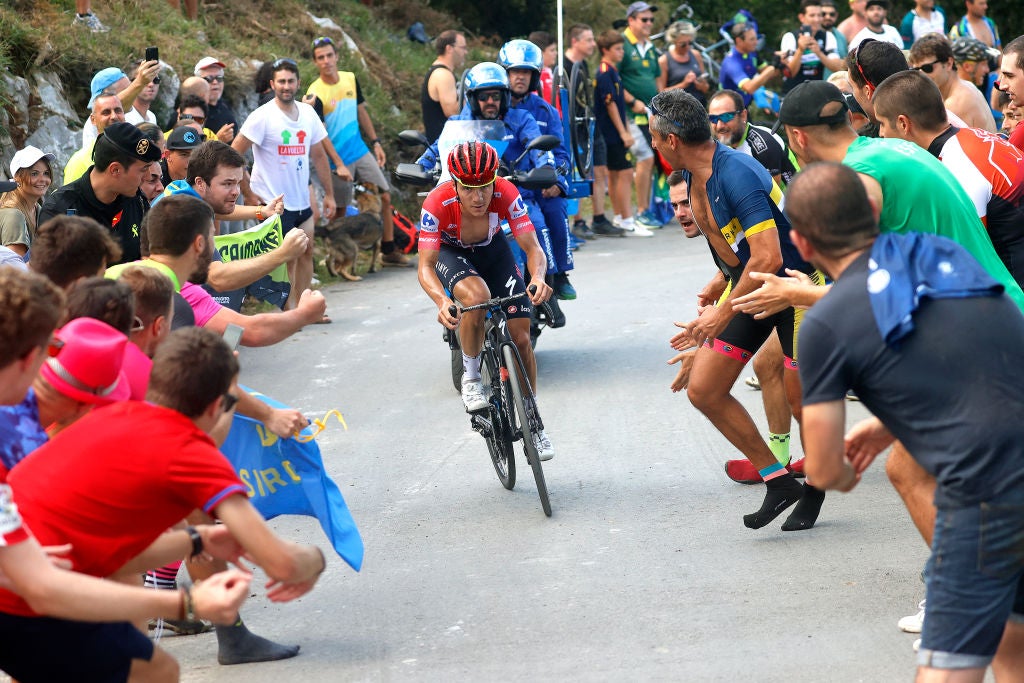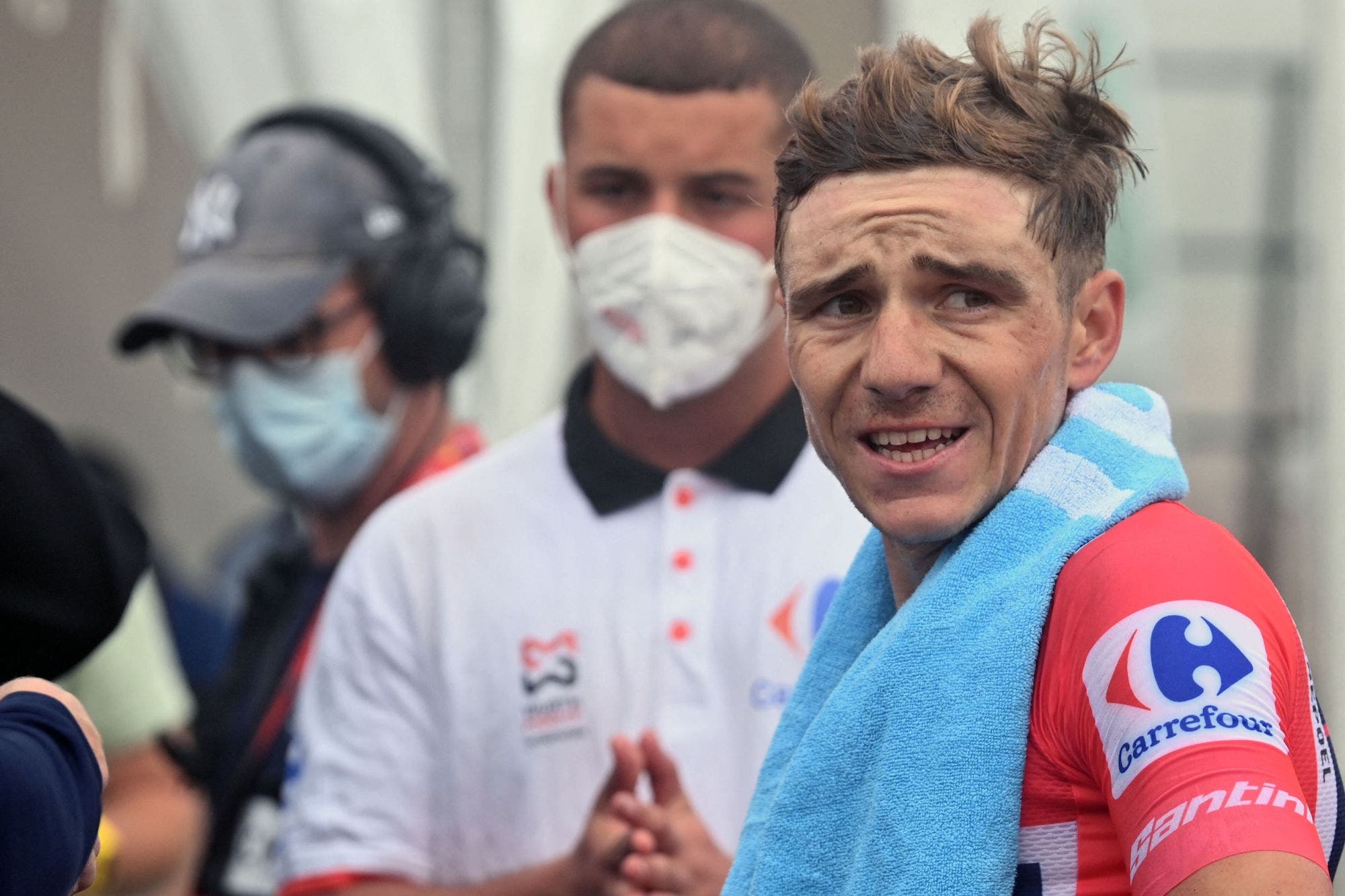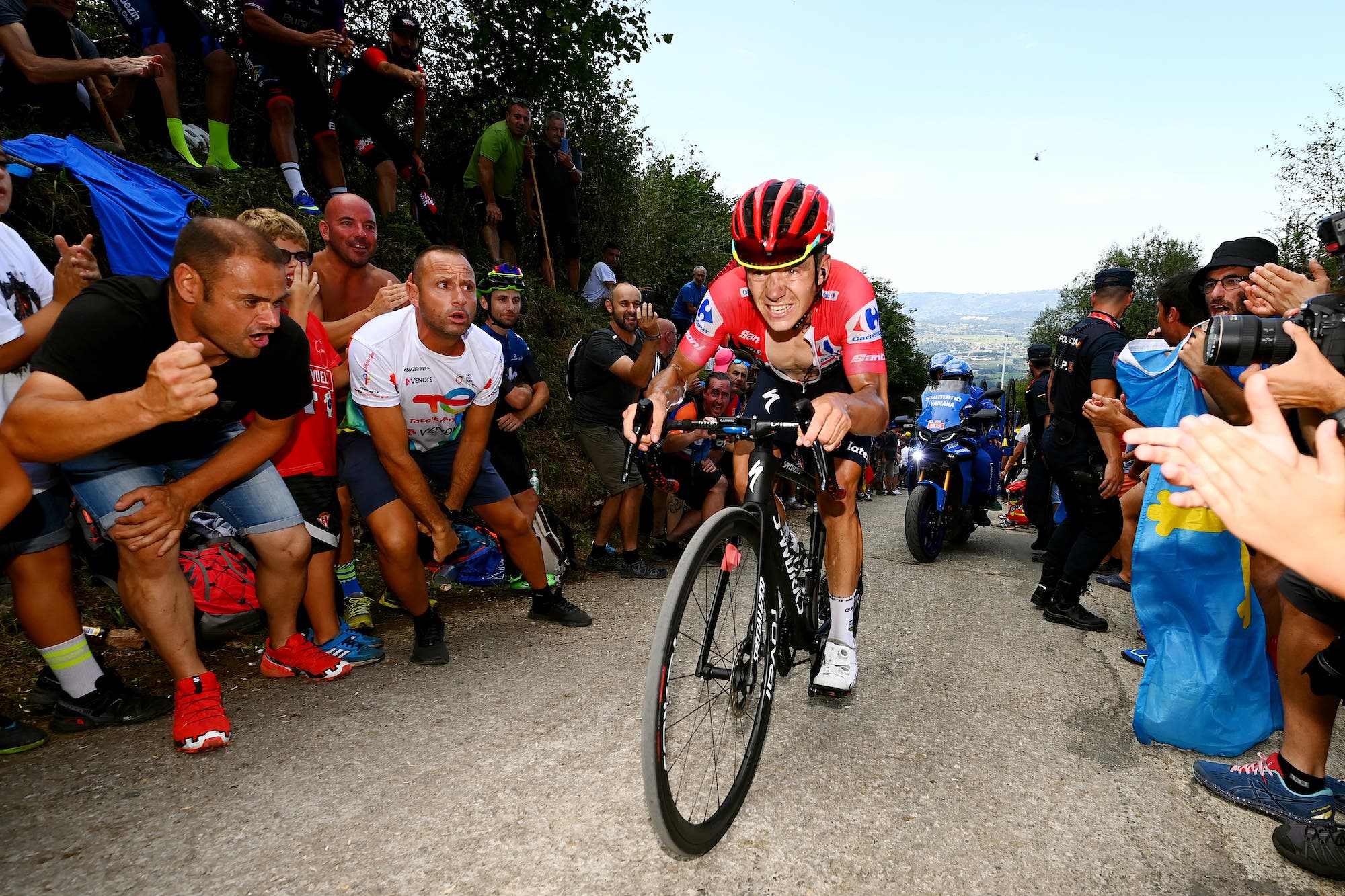How long can the 'Remco Rampage' last at the Vuelta a España?

Remco Evenepoel kicks clear of his rivals on stage 9 (Photo: Luis Gomez - Pool/Getty Images)
ALICANTE, Spain (VN) — No one expected Remco Evenepoel to carry the red jersey into the halfway point at the Vuelta a España, not even himself.
Or at least that’s if you take Evenepoel at his word.
Evenepoel’s stunning rise in this Vuelta is seen by many as a complete shock, and in many ways it is.
Even by his own measure, and the personal high bar that he sets for himself, Evenepoel was kind of a flop in his grand tour debut. Or at least for a rider who demands so much from himself.
The Belgian talked a big game going into last year’s Giro, but couldn’t match the searing accelerations that grand tour racing requires, and flamed out after crashing despite riding within 11 seconds of the pink jersey early in the race.
Also read:
- The current overall standings of the Vuelta a España after stage 9
- Vuelta a España: Enric Mas goes into red trying to follow Evenepoel: ‘Next time I’ll know better’
- Remco Evenepoel blows doors off everyone at Vuelta a España
- Vuelta a España: Primož Roglič ‘limited damage’ in Evenepoel raid
To see Evenepoel ride away from the Vuelta’s best climbers in the opening three mountaintop finishes is nothing short of staggering. Or is it?
If one rolls back the tape, Evenepoel’s personal rise at this Vuelta and against this field that’s battered and bruised shouldn’t be seen as a complete surprise or shock.
It’s worth remembering that Evenepoel’s Giro debut last year came barely nine months after he fractured his hip after falling into a ravine at the 2020 Il Lombardia, a crash that nearly derailed his promising career right out of the starting gates.
That Evenepoel made it far as he did last season — he went on to win eight races after abandoning the Giro last year — is more extraordinary than how he’s cutting through Vuelta peloton like a warm knife through Spanish mantequilla.
In many ways, the 2021 season is Evenepoel’s first full season without major disruptions caused by injury, COVID, or other debilitating crashes.
Evenepoel’s been winning races, smashing expectations, and rewriting the rules since he burst onto the scene in 2019. That he’s leading this Vuelta against a hobbled field of rivals and on a near-perfect course for him so far cannot be viewed as some sort of aberration.
Evenepoel put a big circle around the Vuelta

And a key factor in Evenepoel and his performance so far in this Vuelta is that he put the Spanish grand tour at the center of his season’s plans.
Unlike GC contenders Primož Roglič, Enric Mas, Jai Hindley, Richard Carapaz, Simon Yates, and the list goes on, whom all raced the Giro d’Italia or the Tour de France this season, Evenepoel is one of the few riders in the top-20 who put the Vuelta as one of their primary goals of the year.
Roglič and Mas are coming off injury and/or COVID at the Tour, while Hindley, Mikel Landa, and Carapaz all raced the Giro, took extended breaks, and only — perhaps begrudgingly in some cases — reloaded for the Vuelta.
In fact, the strongest and freshest riders so far in this Vuelta, besides the class and ambition of Mas and Roglič, have been riders who also put the Vuelta as a singular target.
Tao Geoghegan Hart was overlooked for the Tour, and until he crashed Sunday and lost more than 5 minutes, was poised to be a serious podium contender.
Carlos Rodríguez and Juan Ayuso, two Spanish revelations making their respective grand tour debuts, also prepared especially for the Vuelta, and it shows in their leg speed, body language, and general desire to race.
And it’s also worth pointing out who isn’t here — namely Jonas Vingegaard, Tadej Pogačar as well as Egan Bernal, cycling’s three “capos,” even if Bernal remains a question mark if he can regain his full grand tour capabilities.
The Evenepoel of the first half of this Vuelta is the end result of a transformed rider.
After his frustrations at the Giro last year, Evenepoel admitted he needed to up his game if he wanted to seriously contend for a grand tour someday. He leaned up and lost weight — 2kg by his measure — which is a lot on his already compact frame.
Evenepoel got serious about his diet and nutrition, perhaps realizing in last year’s Giro that his pure class alone wasn’t going to guarantee him success at the very highest level of the WorldTour. The first payback was his victory at Liège-Bastogne-Liège, a spectacular win by any measure.
A high-altitude training camp in Italy in July seemed to put Evenepoel on Vuelta-winning footing. Matteo Tosatto, a sport director at Ineos Grenadiers who was also there with some of his team’s riders, said he could already see Evenepoel was climbing better than ever.
João Almeida made an interesting observation in Monday’s press conference, saying the way Evenepoel is climbing so far in this Vuelta he could match Vingegaard and Pogačar at their Tour-best.
And in terms of confidence, attitude, and demeanor that it takes to win a grand tour, Evenepoel has all of that in spades.
The 22-year-old has no shortage of ego and ambition, but insiders say he’s no longer the cocky teenager from 2019 who believed the hype that he was the next Belgian Merckx.
Crashes, a few setbacks, and a cold dose of reality at the Giro and other races, including this year’s clash with Pogačar at Tirreno-Adriatico, put Evenepoel on a more realistic and eventually determined path.
How long can the ‘Remco Rampage’ last?

The big question now is can Evenepoel go the distance?
The longest race he’s completed to date is this year’s eight-stage Tour de Suisse, where he was 11th overall and won the final time trial. The most race days he’s completed in a row came during last year’s Giro, putting 17 stages into his legs before abandoning.
So will he run out of jet fuel before hitting Madrid? Enric Mas said Monday that’s the only hope his rivals have right now if he keeps climbing the way he’s been so far.
Tuesday’s time trial will likely see Evenepoel take a minute if not a lot more on all the Spanish climbers nipping at his heels. Only Roglič or Almeida might be able to claw back some time.
Somewhat telling of the more mature, mellower Remco is that he says he’s still hunting a stage win, something that’s eluded him so far.
Make no mistake, he’s racing to win this Vuelta.
Evenepoel and Quick-Step rode a tactically smart race across northern Spain, where the shorter, explosive climbs were perfect for the new-look Evenepoel to drop the hammer.
If he’s nursing a lead of three minutes or more coming out of Alicante’s time trial, Evenepoel would need to have a major crack or collapse to lose this race.
Yet as all his rivals keep saying, the Vuelta is long, and Madrid is still far away.
In fact, everyone inside the Vuelta caravan was moaning the other day about how long this Vuelta already feels after just nine stages raced. Foreign starts, with the added travel and hassles, will do that.
The south will be hotter, perhaps not ideal for Evenepoel’s Belgian constitution. The climbs are longer, especially at Peñas Blancas and the Sierra Nevada looming this week.
And there’s always the specter of late-race collapses and raids that the Vuelta is renowned for. The Vuelta’s full of cadavers of good GC intentions that were caught out in ruthless shootouts. Fuente Dé, Formigal, and Navacerrada are just a few during the past decade.
Evenepoel’s unexpected rise to the occasion is catching a lot of people by surprise, yet he seems to be handling the race responsibilities with aplomb.
At 22, he’s already used to being and racing in the limelight. More than 100 journalists showed up to his first team training camp in 2019 in Calpe, Spain, when he turned pro. In fact, Evenepoel is one of those rare athletes who embrace the pressure and attention that comes with the glare of the TV cameras.
No one really rated him to emerge as a true GC grand tour contender as fast, or perhaps ever.
Quick-Step isn’t renowned for its grand tour legacy. The team’s earned its chips in the sprints and on the pavé, and has not won a grand tour since Patrick Lefevere created the team in 2003.
This time it feels different. Evenepoel is a generational star who’s already proven he’s a rider capable of blowing the wheels off everyone in one-day races and shorter stage races.
That his grand tour “arrival” came sooner than expected — some thought he never would — is only good news for cycling.
Today’s peloton is deeper and more balanced than ever before in history.
Even if the well-funded “super teams” are dominating many of the grand tours — Ineos Grenadiers, Jumbo-Visma, and UAE Team Emirates have won every yellow jersey except one since 2012 — today’s grand tours are delivering more surprises, suspense, and twists.
Evenepoel’s rise, even if he flames out before Madrid, is just what this Vuelta needed.